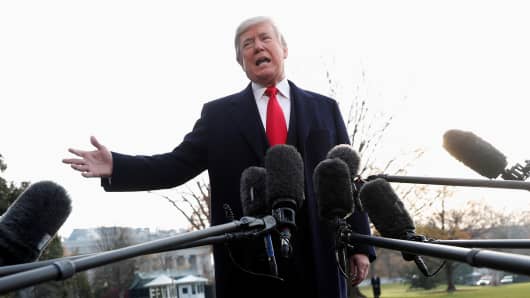It's another day of extremely volatile trading following Monday's single largest point drop in the history of the Dow Jones industrials average.
So far, President Donald Trump is silent. For once, he's too silent.
Yes, several members of the Trump administration have made calming statements, including Treasury Secretary Steven Mnuchin and Council of Economic Advisors Chairman Kevin Hassett. But this is really Trump's job for many obvious reasons – especially because his statements will get the most necessary attention.
At this point, there's a nagging possibility that the president's silence now is the result of his frequent cheerleading and taking credit for the stock market's meteoric rise since his election.
The conventional wisdom scolded Trump for taking the risky position of "owning" the markets when they can turn negative at any moment without much notice, as they have now.
In all fairness, there was a good counterargument that the president needed to grab credit for the market rally in the face of the steady stream of negative coverage of his presidency. Objectively, the markets have been strong since he won the presidency, and it makes sense that he wanted to get as much attention as possible for it.
Now, though, it sure looks like Trump prefers to remain conspicuously silent.
That's the wrong way to go for two big reasons.
First, speaking out sooner rather than later allows Trump to control much of the narrative. The key part of that narrative could be the fact that stocks are still more than 30 percent higher since the election.
Second, some history from 30 years ago provides the most compelling reason why Trump should speak out.
In percentage terms, the 1987 stock market crash was much more severe than what we're seeing now. But just like in 1987, the economy today is generally strong and growing. Employment and wages are up now and they were up then. Also, thirty-plus years later, we now know that crash had nothing to do with the economic conditions facing Main Street.
That was the solid ground President Ronald Reagan chose to stand on during the 1987 market madness, and he never hesitated to speak out.
First, he made an informal statement the day of the crash to reporters as he was leaving the White House. He wisely admitted he didn't exactly know why the market was selling off so sharply, but he reminded everyone the economy was still strong. Three days later in a more prepared and formal setting inside the White House, Reagan told the country that it should expect more market volatility, but his administration was working to make sure it was doing everything it could to insure more investor confidence. He then reiterated the fact that there were, "no signs of deteriorating economy out there." Finally, he insisted that the market hiccups were a much less menacing threat to American businesses than the taxes he had spent so much of his presidency cutting in the first place.
Trump today doesn't even need to change any of Reagan's message. The focus on tax cuts helping businesses and consumers would especially work well. Even if the stock market slide doesn't hold through the week or the month, Trump can prove he's at least not tone deaf to potential panics and that's he big enough to at least acknowledge a stock market drop.
If the market decline lasts much longer, it's still an opportunity for Trump to pivot more to focusing on the overall economy and jobs.
Either way, saying nothing is his worst option. That's especially true since his opponents will not hesitate much longer to use this market mayhem against him.
No, this is not an actual market crash and the nation's investors are not in a real panic. But it is a time for Trump to show some more depth and durability as a leader for the entire country. He shouldn't wait any longer to do it.
Commentary by Jake Novak, CNBC.com senior columnist. Follow him on Twitter @jakejakeny.
For more insight from CNBC contributors, follow @CNBCopinion on Twitter.



